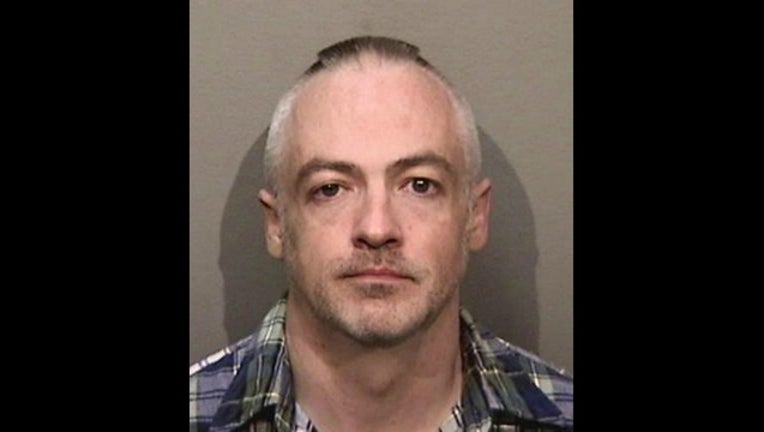Former NU professor Wyndham Lathem praised in letters from supporters

CHICAGO (SUN TIMES MEDIA WIRE) - A world-renowned expert on deadly pathogens who hoped to help stamp out deadly diseases. An encouraging mentor who helped struggling students become respected researchers. An outgoing pal, who became ordained so he could officiate at two friends’ wedding.
Wyndham Lathem was many things to the more than 30 people who wrote letters of support after his arrest for a brutal murder prosecutors allege he carried out to fulfill a “sexual fantasy,” the Chicago Sun-Times is reporting.
At a routine hearing on Monday, a day after prosecutors laid out the gruesome details of their case against Lathem and co-defendant Andrew Warren at a bond hearing, he appeared to have no supporters in the courtroom gallery.
Prosecutors say Lathem and co-defendant Andrew Warren spent months planning to commit multiple murders, then to kill each other. On July 27, the pair teamed up to murder 26-year-old Trenton Cornell-Duranleau inside Lathem’s River North apartment, stabbing him a total of 70 times, with such force one of the knives broke.
Outside the courtroom Monday, Lathem’s attorney said the case against Lathem appears to hinge on statements Warren made to police.
“The state’s proffer seemed to be based in large part on the statement of Andrew Warren, a self-confessed murderer,” attorney Adam Sheppard told the Sun-Times. “We are conducting our own investigation. It’s already under way and we will have facts which differ from those proffered at the bond hearing.”
All of the 32 letters filed with the court by Lathem’s attorneys were dated within days of the date the two men surrendered to police in Northern California, and before details of the killing were made public.
Police said Lathem sent a video message to several friends, stating he was “not the person others thought he was,” and that Cornell-Duranleau trusted him completely and Lathem had “betrayed that trust.” It is not known if any of the letter writers also received Lathem’s message, though most authors seemed to concede that there had been a murder, but violence was out of character for Lathem.
Several touted his groundbreaking research on the bacteria that caused the Black Plague, and sought to remind the judge of the rigorous law enforcement screening required for researchers to get clearance to handle deadly pathogens.
One colleague, writing on Northwestern University stationery, said Lathem’s work could lead to cures for the plague and related diseases. Northwestern fired Lathem after a warrant was issued for his arrest, and has removed all stories and photographs of him from the university website.
“I feel his contributions will eventually lead to the eradication of these infections, which continue to kill several thousand people every year,” he wrote. “Wyndham has directly and indirectly made important contributions to the betterment of our society and the human condition.”
One letter states that another friend had volunteered to let Lathem live with them should he post bond on the murder charge.
Chicago Sun-Times’ attempts to reach the authors Monday were unsuccessful in all but a handful of cases, and those who would talk were brief.
“I cannot reconcile what I have heard on the news with the person that I know,” said a woman who had written that she had known Lathem since their undergraduate days at Vassar College.
In her letter, the friend wrote that Lathem had remained devoted to another friend in San Francisco, who suffered from a chronic illness, and theorized that Lathem’s flight from the murder scene ended in northern California because Lathem wanted to “be in close proximity to his dear friend and seek her confidence and guidance (and also ensure her wellness) after the terrible events occurred.”
Another friend unintentionally pointed up the privileged life Lathem led, in contrast with all but a handful of the people facing murder charges in a city that sees hundreds of killings each year. By way of describing the microbiologist’s generosity, he recalls how Lathem had offered free use of a vacation home owned by his family in Provence, France.
Lathem had been passed over for a position leading a research lab at the Institut Pasteur in France earlier this year, after French authorities denied Lathem security clearances needed to handle plague and other pathogens. The researcher whom Lathem was supposed to replace lauded his research but did not mention why he had not been able to take the job.
A University of Illinois at Chicago professor who worked with Lathem said the were “horrified” by Cornell-Duranleau’s death, but remained supportive.
“Whatever happened on July 27 is but one day in Wyndham’s life, and cannot erase the person he was every other day,” she wrote. “I mourn for Trent and am horrified by the violent tragedy that ended his life. I don’t know what the future holds for Wyndham, but know he will not face it alone.”

